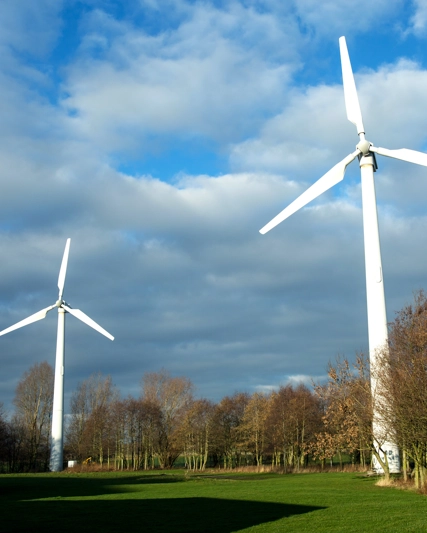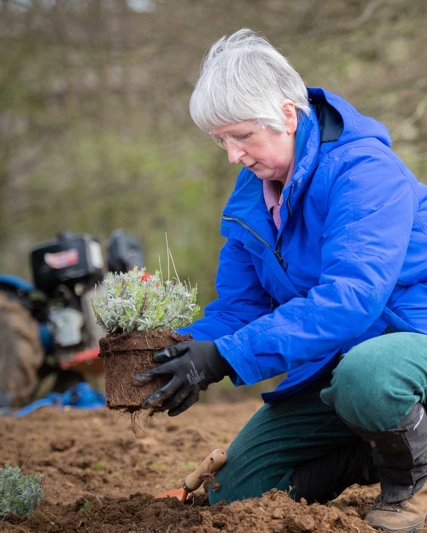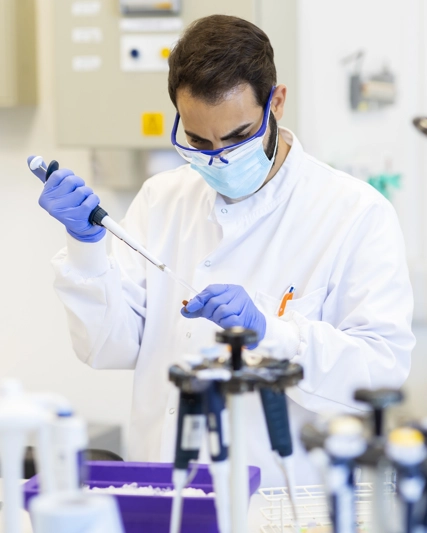Freshwater
Water is a key part of our nature strategy as it’s fundamental to human health and the sustainable production of our vaccines and medicines.

While climate change must be tackled at a global level, water challenges are much more localised. By better understanding our water use across the GSK value chain, we can focus our efforts in the areas where we can make the biggest difference.
The world is expected to face a 40% shortfall in fresh water supply within 10 years1, exacerbating the current water crisis that many are already facing globally. In relation to healthcare, fresh water is critical to achieving universal health coverage, and for GSK, ready access to a fresh water supply enables us to produce vaccines and medicines and safeguard livelihoods.
Our water targets
We have set out the following targets:
- Achieve good water stewardship at 100% of our sites by 2025
- Achieve zero impact active API levels1 for all sites and key suppliers by 2030
- Be water neutral in our own operations and at key suppliers in water-stressed regions by 2030
How we plan to achieve our water targets
Understanding our value chain water footprint
We have mapped our water footprint by establishing the volume of water we use throughout our value chain and where it is being used around the world. Our measure of whether an area is water-stressed considers the quantity, quality, WASH risk (access to water, sanitation and hygiene) and regulatory and reputational risks across our value chain.
Understanding our value chain water footprint (PDF - 74.9KB)
Water stewardship and water use
In 2024, 100% of our sites continued to achieve good water stewardship status, in line with the Alliance for Water Stewardship’s definition. This involves reducing the amount of water we use, improving water quality through minimising discharges and working with community and public sector stakeholders to address local water challenges. These plans are developed to reflect the local water basin challenges.
At all GSK sites and key suppliers-located in water stressed regions, we are committed to water neutrality by 2030. We used water risk data from the World Resources Institute (WRI) and the World Wildlife Fund (WWF) to understand which of our sites are located in water-stressed basins, and therefore face increasing water availability, quality and access risks.
We define water neutrality at these sites using three criteria: achieving the Alliance for Water Stewardship Standard certification, reducing water use by 20% and by replenishing water quantity in the basin equivalent to the site’s 2030 footprint. Where possible, we address shared water challenges in the basin through collective action, including access to clean water, hygiene and sanitation (WASH) services. Our approach extends to key suppliers co-located in these water-stressed regions.
We have identified several initial water basins in water-stressed regions where we have manufacturing sites, including in Algeria, India and Pakistan, which we will prioritise for investment in water neutrality in a way that is responsive to the local challenges.
For example, we have partnered with a local NGO, Watershed Organisation Trust (WOTR), in Nashik, India on a water replenishment project designed to improve ecosystem conditions, enhance the climate resilience of local agriculture, and help local villages manage water resources to improve their health and livelihoods.
We are also a founding partner of the Women + Water Collaborative in India, which launched in October 2023, working with the Water Resilience Coalition, an initiative between the UN – Global Compact and the Pacific Institute. This programme brings together companies from different sectors to leverage women’s leadership to improve access to clean water and sanitation, ultimately supporting the health of local communities.

The Climate and Us series
Find out more about our work with WOTR, and how we’re reducing our water use at our Nashik site, in India.
Supplier engagement
Our supply chain accounts for 95% of our water footprint2. It’s therefore important that we also engage our suppliers on efficient water usage, particularly those based in high water-stressed areas where we are aiming for water neutrality at our sites and key suppliers. We are developing a programme to partner with our suppliers, to better understand their water impact and identify ways of working together to achieve our water goals.
Collaboration
We realise that collaboration is key to expanding the scale and scope of our water efforts to address the magnitude of the global water crisis. We have been members of the UN CEO Water Mandate since 2009. The Mandate is a commitment platform for business leaders and learners to advance water stewardship.
Endorsing companies commit to action across six key elements and report annually on progress. In implementing water stewardship, endorsing companies also identify and reduce critical water risks to their businesses, seize water-related opportunities, and contribute to water security and the Sustainable Development Goals. As a member of the WRC we have pledged to achieve the following through individual and collective action by 2050:
- Net positive water impact - Achieve a measurable and net positive impact in water-stressed basins on availability, quality and accessibility through industry-leading water operations and basin initiatives
- Water-resilient value chain - Develop, implement and enable strategies to support leading impact-based water resilience practices across the global value chain
- Global leadership - Raise the global ambition of water resilience through public and corporate outreach
GSK is the Basin Champion for the Godavari basin in India, a water-stressed region where many of our key suppliers are located. This includes those involved in the water-intensive production of active pharmaceutical ingredients that are critical for our medicines and vaccines. In this role, we’re committed to working with our partners and local communities on programme to reduce water usage and enhance water security.
Pharmaceuticals in the environment
We’re committed to keeping any Active Pharmaceutical Ingredient (API) emissions from manufacturing – including those that might contribute to antimicrobial resistance – below the predicted no-effect level for all sites and key suppliers. This means ensuring any API emissions from manufacturing are kept below levels that negatively impact human health or the environment. We carry out environmental testing on all of our pharmaceutical products and use this data to set safe discharge targets for our manufacturing supply chain. For antibiotic emissions, these safe discharge targets are industry standards agreed through the AMR Industry Alliance.
We are a partner in the Innovative Medicines Initiative project which is a leading collaboration across industry, academia, governments and others focused on the Prioritisation and Risk Evaluation of Medicines in the Environment (PREMIER). This programme is addressing the science and data gap behind safe levels of environmental risk for APIs, making environmental data on APIs more accessible and supported with credible science. The project is also supporting greener design of pharmaceuticals.
We lead the AMR benchmark, which includes recognition of our environmental risk-management approach.


